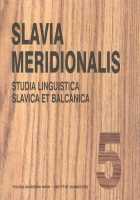Исторята като факт, събитие и наратив. Богомилката на Блага Димитрова и Емилиянстаневите Дневници и герои
History as fact, event and narration. Bogomilka by B. Dimitrova and Memoirs and heroes of E. Stanev
Author(s): Galia Simeonova-KonachSubject(s): Language studies
Published by: Instytut Slawistyki Polskiej Akademii Nauk
Summary/Abstract: The basic problem presented in the article concerns the relations between the historical fact, narration and literary fiction. Their mutual connections in the structure of a literary work are analyzed on the basis of the drama Bogomilka by Blaga Dimitrova and philosophical historical prose and Memoirs by Emilian Stanev. All these literary works were released in the second half of the 20th century and in spite of their historical plot – the action takes place in the medieval Bulgaria, in the time when heretical religions movement called bogomilism was spreading across at Balkans – the basis part of the problems refers to the question of totalitarianism. Emilian Stanev analyzes the history of his nation, creates the presented world and characters in order to show one of the polyphonic sources of Bulgarian spirit, its nihilism and scepticism. The author transposes fiction and historical facts to the realistic, totalitarian world described in his Memoirs which were published after the fall of the communist regime in Bulgaria in 1989. The same happened with drama by Blaga Dimitrova written in 1974 and published almost twenty years later. Blaga Dimitrova makes use of the model code of Bogomil theme, particulary religions and intellectual niche in the national history used earlier by propaganda and transformed into manipulated symbol of freedom. Using this code and interpreting it in a different way than offi cial propaganda Blaga Dimitrova presents the essence of totalitarian society similarly to the dangers resulting from metamorphosis of every idea into ideological concept. The poetics of the drama refers to the aesthetic values of expressionism and modern drama and brings us directly suggestions about manipulative character of totalitarianism. The language of Bogomilka is very modern in spite of the medieval background and it is a good instrument in hands of the author to decipher contemporary references and sense of her own literary fiction. The attitudes of these two authors vary. Emilian Stanev transposes the contemporary problems to the Middle Ages and Blaga Dimitrova, in turn, wants to unlock the modern reality with the key of the past.
Journal: Slavia Meridionalis
- Issue Year: 2005
- Issue No: 05
- Page Range: 75-95
- Page Count: 21
- Language: Bulgarian

